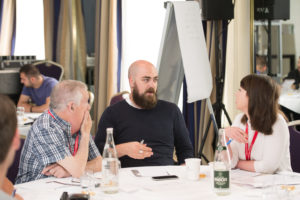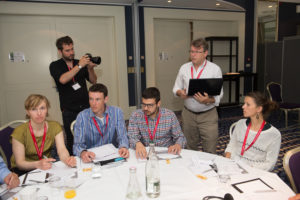The second standalone EHC leadership conference took place in Brussels from the 9th to the 12th of June, 2016. The conference brought together volunteers, staff and board members from each EHC National Member Organisation (NMO), in order to discuss common goals and challenges that countries face in their bid to achieve sustainable haemophilia care. The weekend consisted of a series of workshops designed to improve the leadership, negotiation and communication skills of all the NMO’s in Europe and to engage with each other to build a support network between countries.
The first day began with a series of workshops that approached the theme of both internal and external communication. Discussions regarding internal communication highlighted the need to encourage members in each NMO to be more engaging with each other.
“There is too much one-way communication,” said Fred Cuijpers of the Dutch Hemophilia Society. “Personal involvement within the NMO is very important to keep a dialogue between its leaders and members.” It was established that there is a constant need for interactions within NMO’s and that surveys, media and questionnaires, are a good way of keeping the activities, ideas and goals of the organisation fresh.
External communication is something that all NMO’s find themselves trying to master, whether it is with their country’s health board, government, the media or with pharmaceutical companies. Gaining respect and legitimacy with policymakers can be difficult and different tools and tactics can be used to tackle this. Sessions on the Friday afternoon, focused primarily on the use of I.T. and social media skills, in order to improve the transmission of information and to advocate for the main goals within an NMO. Kristine Jansone of the EHC ran an informative session on all the online platforms that can be used to run an NMO in a smooth, transparent and organised way. This was followed by a social media workshop which encouraged NMO members to publicly inform, engage, report and voice opinions to the larger community. It was also recognised that social media can be an important resource to use within NMO’s, providing private platforms for members, patients and family members to share experiences and advice. It was established, that peer to peer support as opposed to medical practice can be equally, and sometimes more beneficial to members. The increased use of apps was also an indicator of how technology is having an increasing impact on haemophilia care in Europe. Haemophilia apps have the potential to provide a range of services such as tracking haemophilia treatment centres (HTC’s) while abroad, providing key statistics regarding half-life, sending reminders for factor infusions, sending updates and messages from your NMO, how-to information, interactions with medical professionals and much more. Some countries already have or are in the process of creating these apps, which will promote independent care and improved knowledge in dealing with their disorder.
Friday night saw the official launch of the film entitled ‘Haemophilia Stories’ produced by Goran Kapentanovic. The film documented individuals with haemophilia in France, Ireland, England, Sweden, Bulgaria and Romania, explaining what haemophilia is, how it impacts the daily lives of the individuals affected by it and also the stark difference between haemophilia care in these countries. The personal stories made for a very touching film and the screening was followed by a discussion with Goran and two of the featured participants in the film: Boyan Boyanov from Bulgaria and Christian Dragusin from Romania, who shared their personal views and experiences while featuring in the film.
The second day introduced the concept of external relations with pharmaceutical companies and funding practices. Dr. Paul Giangrande, Chairperson of the EHC Medical Advisory Group, outlined the important factors that need to be considered, when dealing with pharmaceutical companies such as funding, clinical trials, company’s influences and publications. Although it is common that one company might fund a specific event or project, it is also important to seek out unrestricted funding. Funding is crucial but we also need to have a constructive dialogue with pharmaceutical companies based on mutual trust and respect. Companies need to know patients’ needs and this is a fundamental issue in many countries where neither the patient nor the NMO has any input in the quality or quantity of the medication given to them. Patient confidentiality should be respected, and all relations between NMO’s and pharmaceutical companies should be carried out with complete transparency. All interests should be declared honestly and openly from the beginning.
A negotiation workshop followed which was chaired by Kristine Jansone of the EHC. Kristine outlined some key points for useful preparation strategies such as the importance of separating the people from the problem and preparing the best alternative to the negotiated agreement. Negotiation strategies were discussed such as using the correct language, using positive phrases, agreeing with the opposition when possible and most importantly, aiming for and accepting a mutual satisfaction between both parties. A communications lecture by Danish expert Arjen Mol also highlighted how it is often useful to assess the personality of the people you are dealing with to build relationships – if the negotiating experience is positive for decision makers, it will likely open doors for further discussions. Case studies revolving around tenders and procurement put the theory of each of these topics to the test and allowed delegates to emulate scenarios they would be faced with in reality.
With just six months experience as a staff member of the Irish Haemophilia Society, I approached this conference as an opportunity to learn more about treatment for bleeding disorders, the contrast of haemophilia care in European countries and of course, all the communities involved. It would be an understatement to say I was blown away by the drive and strength in the people who are advocating and often struggling for an improved access of treatment for the people with haemophilia in their individual countries.
Collectively and individually – what can we do? It is vital to encourage younger generations to constantly challenge and question the way NMO’s, health boards and tender boards are managed and to always strive for improvement. In order to do this, we need to take the skills we have learned and build on them both within our individual NMO and also alongside our fellow European NMO’s. The EHC and conferences like these are vital to maintain a continued standard of haemophilia care as they offer the tools, resources, assistance and support needed to give NMO’s a platform and the encouragement to approach their governments and policy makers. Along with the help of the EHC, we can also learn from each other with the positive or negative experiences we may have had. The main take-home message after the weekend was to ensure that the learning process did not stop when everyone returned home. Contacts were shared and alliances were made, skills were learned and it is with these resources that NMO’s will be able to reach out and ask for help from each other and continue to strive for sustainable haemophilia care in Europe.
Aoife Ní Fhógartaigh

